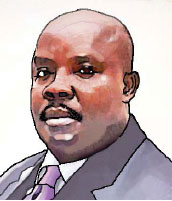By Emeka Alex Duru
If there had been any doubt on the level of suspicion and animosity between indigenes of the South East and the Nigerian Army, events of the last two days, have banished such.
As a people, the Igbo of the South East, are known for valour. Not known for centralised kingship structure, the constituting units had always fashioned out arrangements to protect themselves in times of crisis or war with their neighbours.
Aside these local arrangements, there were some that operated what could pass for standing armies that were readily mobilised in terms of need. Some even went to the extent of serving as mercenaries to their neighbours that were not so much endowed with fighting forces.
To that extent, the sight of a soldier would not be strange to the Igbo. But apparently on account of the command and control structure of the modern army which runs contrary to the village republic orientation of the Igbo, encapsulated in consultation, compromise and consensus, as basis for embarking on an action, the people are often at the wrong end of relations with the soldiers.
This fragile relationship did not start today. For a traditionally independent-minded people that are often accused by others as unyielding and stubborn, successive rulers of the country had always resorted to the use of the military to force them go against their will.
When for instance, the British imperialists easily had their way in introducing indirect rule in the North and West, they encountered stiff resistance in the East, forcing them to call in their soldiers.
Even then, it was not a smooth ride for them as the people, including their women, resisted the move, forcing the colonial administrators to settle for the Warrant Chief arrangement.
On such instances, the scares that trailed the encounters, always remained, including the copious disdain that the Igbo developed for the men in uniform.
At a point even, it was seen as running against the grain of conventional reasoning for a family to allow one of its own to enroll in the Army.
To illustrate how deep the people detested the Army, they evolved the saying that, “Nne muru Soja gba aka nwa” (Any woman that has a soldier son, is a barren). This took roots from their interpretation of actions of soldiers, which to them, lacked reason and human face. The immediate impact of this insinuation was the initial unexciting response from bright children from the area in joining the Army.
Those that did, were seen as ones that could not fit into more intellectually tasking engagements. They, somehow, fell into those categorized as bullies in their various villages.
Incidentally, the military has not done much to erase this insinuation from the mind of the Igbo. During the 1967 – 1970 civil war that was advertised as an exercise in uniting the country, the bestiality of the federal troops on Biafrans, added to the suspicion the people had on soldiers as men without heart and mind.
It is the same highhanded tendency that the soldiers have brought to bear in the current efforts at preventing the Indigenous Peoples of Biafra (IPOB) from agenda of a separate state of Biafra from the current Nigerian federation.
On occasions when the Army had taken on the largely unarmed IPOB, it had always been a tale of blood and decapitated limbs on the side of the agitators.
In November last year, a report by Amnesty International on the bestiality of the Nigerian Army against members of the organisation, was damning.
The release which captured the atrocities of the soldiers on the group between August 2015 and August 2016, put members of IPOB killed by the military within the period at over 150.
The Amnesty account of the situation was not based on hearsay, nor conjecture. It rather relied on analysis of 87 videos, 122 photographs and 146 eye witness testimonies, all revealing soldiers of the Nigeria military firing live ammunition to disperse IPOB members whose only offence was demanding a separate independent state of Biafra.
A chilling aspect of the report was on how, at least 60 defenceless IPOB protesters were shot dead within two days leading to the Biafra Remembrance Day of May 29, 2016. It also captured the gory incidence of massacre of the members of the organisation in Aba, Abia State, earlier in February, that year. The Army however debunked the claim, describing it as an attempt to tarnish the reputation of Nigerian security forces.
Allegations of strong arm tactics on the people by the military came up again during the invasion of Aba and Umuahia, Abia State, last month. Though the Army has denied that its men were hard on the people, various figures were posted on the number of IPOB members killed in the episode. The people are still mourning their loved ones killed in the encounter.
It is against the backdrop of this festering sore on the mind of the people that their suspicion on the Medical Outreach of the officers and men of the 82 Division of the Nigerian Army, during the week, could be properly appreciated.
The Army had in line with its Corporate Social Responsibility (CSR) mission, listed some schools and communities for immunisation of children against communicable diseases. However, coming on the heels of the recent loss of their young men in the hands of the soldiers, the people were scared that the very same military that recently mowed their youths were the same extending unsolicited show of concern to their kids.
That, to them, was simply incomprehensible. And they promptly resisted the gesture, going as far as withdrawing their children and wards form schools. Rumour mills even had it that the vaccines were infested with various classes of virus, aimed at reducing the population of the people.
The military has dismissed the allegation, insisting that the exercise was borne of genuine intention. It may be. But certain things do not seem to gel with the exercise. The timing, for instance, is wrong. The people’s suspicion on the soldiers who recently levelled their youths, suddenly turning good Samaritans to them, primitive as it may seem, cannot be waved off.
The Muhammadu Buhari administration has also not been seen as being particularly favourable to the Igbo in its policies and actions. To therefore visit them with the sudden and rootless show of concern especially when the National Immunisation Days (NID) programme is not being observed in the country, would naturally call for deep restraint on the people.
What the federal government, therefore needs to do is to put up actions to win the confidence of the people. Taunting or castigating them over the immunisation issue in Anambra, will rather beg the question. If anything, it will further widen the gulf of distrust between them and the administration.
- Advertisement -
- Advertisement -













